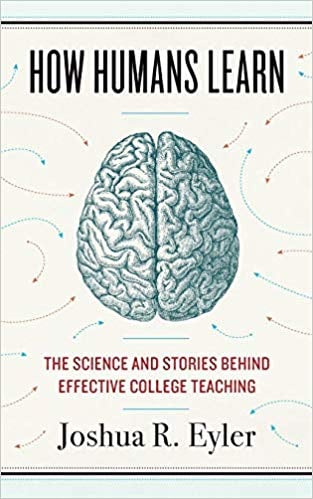You have /5 articles left.
Sign up for a free account or log in.
 How Humans Learn: The Science and Stories Behind Effective College Teaching by Joshua R. Eyler
How Humans Learn: The Science and Stories Behind Effective College Teaching by Joshua R. Eyler
Published in March 2018
The world of education developers is small. And in that world, Joshua Eyler is well-known, universally liked and highly respected.
Judging his fine book How Humans Learn, Eyler’s influence now likely extends to many more corners of the academy.
How Humans Learn is certainly the book I’ve waited for. (And, embarrassingly, did not get around to reading until now.)
As an academic trained outside the disciplines of cognitive science and learning design, I’ve been in desperate need of an accessible book connecting learning science with teaching practices.
What Eyler does beautifully in How Humans Learn is directly connect the research from a wide array of cognitive/learning disciplines to the craft of college teaching. Eyler accomplishes this feat by combining storytelling about how the most gifted academics teach (including his teaching) and by synthesizing and translating the essential findings and debates of the learning science literature.
For college professors, I think the critical contribution of How Humans Learn is that good teaching is constructed, not ordained. Through a combination of applying the core principles of learning design gleaned from the research on learning, and healthy doses of experience and experimentation (and yes, failure) -- almost all of us can develop into effective college educators.
One of the aspects I liked best about How Humans Learn is Eyler’s willingness to step into the fray of pedagogical debates. He is highly critical of a lecture-only approach. The case he builds against the practice of continuous lecturing is tightly tied to the evidence on effective learning.
Where I’d debate Eyler is on his skepticism around online learning. Eyler is a fan of face-to-face interactions, relational-based learning and students and professors constructing learning together through intimate and intense interactions. Fair enough. I’m a fan of all these practices as well.
What Eyler does not consider with enough complexity and nuance, however, are instances where online education can achieve the constructivist/relational learning environment that he champions.
Well-designed online courses, those developed in collaboration with professors and learning designers, can be as immersive and transformative as any face-to-face course. And for many learners -- such as working adults -- online education is the only option.
It will be interesting to see where Eyler takes his scholarship post-COVID. I’ll be curious to learn how Eyler thinks of the intersection of learning science and teaching practices in an environment where face-to-face teaching is no longer the default.
Who knows what disruptions to residential education the future will hold? Will COVID really disappear, and what disease may take its place next? As extreme weather becomes common (thanks to climate change), can we expect more or fewer disruptions to campus operations? (To ask that last question is to answer it.)
The reality is that higher education will need to build a pedagogy of resilience. How that new resilient pedagogy reflects what we know about how humans learn is a question that Joshua Eyler is supremely well placed to illuminate.
What are you reading?




